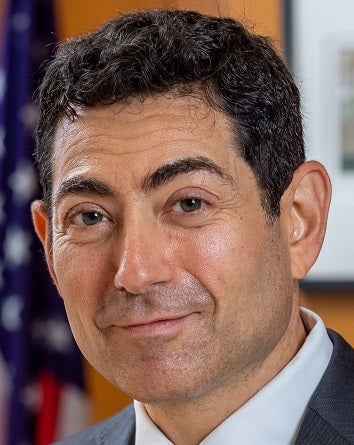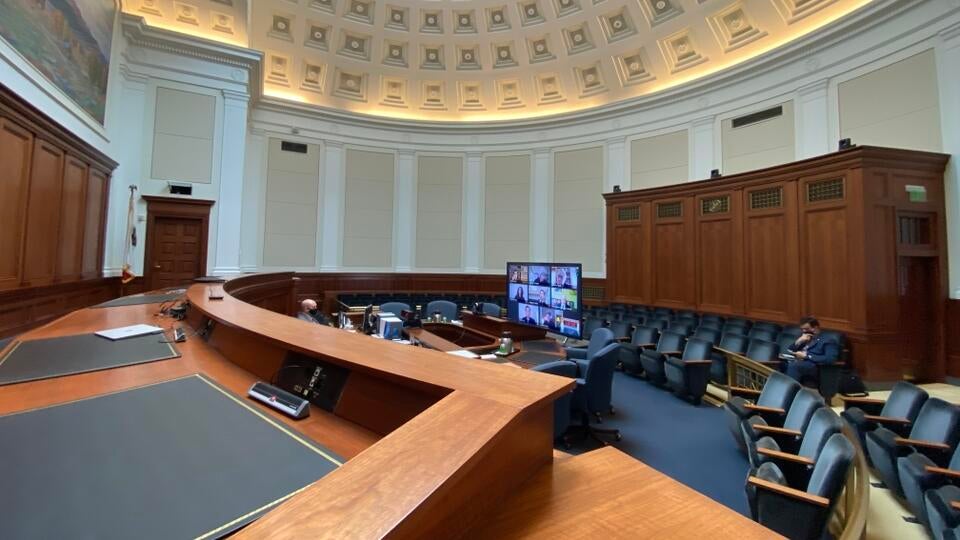Commentary: Investing in Remote Technology and Closing California's Justice Gap

Mariano-Florentino Cuéllar has served as a California Supreme Court justice since 2015. He will become president of the Carnegie Endowment of International Peace in November.
Americans are rightly proud that their court system is independent and plays an important role in our democracy. But our courts are also vulnerable, fragile and need a renewal. As I prepare to leave the California Supreme Court, this keeps me up at night.
Our courts play an enormous role in American life and in the world’s understanding of how we govern ourselves. Most American justice is handled in state courts, where more than 95% of cases are decided. Here in California, 2,000 judicial officers serve in our courtrooms — more than twice as many as all federal judges combined — helping to deliver on the American promise of equal justice. We’ve managed to build a system that responds to the needs of a state population that speaks more than 200 languages.
Despite these successes, our judiciary is far from perfect. Some courts are fractious and divided along ideological lines, and judicial selection has become more contentious. Many Americans wonder whether our courts can rise to the challenge of delivering impartial justice to people of all racial and economic backgrounds.
Our courts also face a variety of practical challenges affecting the quality of justice. Despite the growing acceptance of remote work during the pandemic, trial courts are far too tied to physical locations. Court decisions are subject to long delays. Courts remain dependent on a rickety technological infrastructure and are burdened by a system that leaves far too many people with little knowledge of their rights and means of getting legal help. As Americans question the capacity of their institutions to serve them effectively and people around the world voice growing doubts about democracy, it’s especially important that we strengthen our courts with the right mix of innovation and investment.
First, courts must increasingly treat remote operations as a major — and in some situations, the primary — channel. Courtrooms will remain iconic settings, but a sprawling country demands a judiciary well-suited to resolving disputes without forcing people to spend half their day or more in transit. Here in California, San Bernardino County is larger than New Jersey, Connecticut, Rhode Island and Delaware combined, and is divided by a vast mountain range. Our success in delivering justice to rural and urban residents alike depends on laws and procedures well-suited to remote proceedings.
In response to the pandemic, the Newsom administration granted courts authority to operate remotely. Starting in January, remote services will be available in civil cases, but only for 18 months. Here and elsewhere, we need to make this authority permanent and work on transitioning our in-courtroom procedures to function remotely where necessary.
Second, the courts must make further, carefully chosen technology investments. These investments must do more than facilitate remote proceedings; they can help courts offer self-help resources so that unrepresented litigants have an easier time understanding their rights. They can help ensure courts’ ability to safeguard evidence in the form of algorithms and datasets. The right investments and technical experts can also help safeguard the courts from ransomware and state-sponsored cyberattacks that could paralyze our ability to arraign criminal defendants and conduct civil litigation.
Third, our courts must take on the “justice gap” that leaves millions of civil litigants without meaningful legal assistance while government agencies and well-funded private sector entities have access to the best legal minds. Although many lawyers laudably devote time to represent poorer Americans and nonprofits pro bono, this doesn’t come close to meeting the needs of those who must turn to the legal system to vindicate their rights. Addressing this will require the thoughtful use of technology to help the public navigate a byzantine court system. We should also simplify forms and court rules that can frustrate even sophisticated lawyers. Here in California, we’re exploring another step that could be beneficial elsewhere, too: certification of professionals who lack a traditional law degree but could nonetheless help the public navigate the courts or negotiate settlements, so that the choice isn’t between having a fully certified lawyer or nothing.
These strategies won’t make everyone happy, and they can’t be executed without careful judgment. Nor can we ever expect our legal system to be perfect.
But what we must keep in mind is that the vitality of our courts is a critical ingredient in making nearly any aspiration for our country a reality. A court system capable of living up to its promise is foundational to the world’s perception of the legitimacy of the American system. Few things would make our country’s enemies happier than to see our courts become ossified and ineffective.
Finally, we must endeavor to strengthen the broad public support our courts have historically enjoyed. This community scaffolding is essential for a state court system that carries most of the weight in delivering justice in this country. For this we depend on civic leaders willing to support the enterprise of mass justice across ever-more-familiar divisions of ideology, social standing and geography, and on well-tailored civics education that emphasizes why our institutions matter despite their imperfections.
Debating the merits of our court decisions is as American as chicken-fried steak and jalapeños washed down with boba tea. But when we ignore persistent justice problems, presume that judges are no more than lackeys for the parties of the governors or presidents who nominate them, or — as a former U.S. president once casually asserted —indulge the idea that some of us can’t be trusted to be impartial judges simply because we’re of Mexican origin, we play into the hands of our country’s adversaries and undermine the institutions we hold in trust for our children.


